
The National Interest Foundation Newsletter
Issue 281, April 11, 2025
Welcome to our NIF Newsletter. In this week’s edition, we examine how Israel’s murder of a Palestinian-American teenager in the occupied West Bank has sparked outrage, delve into President Trump’s announcement that the United States and Iran are slated to hold nuclear talks on Saturday, and provide analysis on a Pew Research Center survey whose findings mirrored those of last month’s Gallup poll regarding the American public’s increasingly negative views of Israel.
Editor: Bassam Tarbush
Israel’s Murder of a Palestinian-American Teenager in the Occupied West Bank Sparks Outrage

Elected officials from Rabee’s home state of New Jersey called his killing an atrocity and expressed that they are demanding answers from the Israeli government. (Photo from Reuters)
Earlier this week, Israeli forces shot and killed Palestinian-American teenager Amer Rabee in the occupied West Bank village of Turmus Ayya. The 14-year-old, who was born and raised in New Jersey, was murdered while two of his friends were also severely wounded and hospitalized. The deplorable killing of yet another civilian at the hands of Israeli forces has sparked outrage and elicited concern that it will again go unpunished. As alluded to in the statement from the Palestinian American Community Center (PACC) of New Jersey regarding the incident, the killing of Rabee was “entirely preventable and horrifically unjust,” and warrants an investigation. It also comes at a time when the United Nations has documented that at least 100 children have been killed on a daily basis since Israel’s onslaught on Gaza has resumed. The alarming murder of Rabee has also prompted troubled reactions from elected officials in his home state, with U.S. Representative Bonnie Watson Coleman (D-NJ) calling it an atrocity and Governor Phil Murphy (D-NJ) demanding answers from the Israeli government. For rights advocates and those who have closely monitored the behavior of Israeli forces in occurrences like this in the past, the latest killing regrettably comes as no surprise given Israel’s track record of committing these types of heinous crimes with impunity.
Details of the incident have shed light on the fact that Rabee was shot and killed an appalling 11 times while out picking almonds with his friends. Since there is nothing that can possibly justify Israeli forces’ use of such excessive and lethal violence, predictably, Israel has gone to its commonly-used playbook of claiming that the teenagers “posed a danger” because they were supposedly throwing stones towards a highway – something that has been disputed. What is additionally shocking is that documented accounts of the incident have uncovered how Israeli soldiers denied the victims access to urgently needed medical care by blocking an ambulance from reaching the victims for over 30 minutes. All of this has led observers to label the murder a grave injustice. Some have also pointed to the United States’ culpability in enabling Israel to engage in behavior like this, as the former has failed to give proper attention to increasing Israeli violence in the West Bank which has clearly been on the rise since the onset of the Gaza War.
Many have gathered with the family of Amer Rabee to demand justice for his killing, and have implored the United States to conduct an investigation into it. One human rights activist, Ihab Hassan, remarked on social media that calling a 14-year-old child a “terrorist” for allegedly throwing stones, then executing him and gravely injuring two others without the culprit being held accountable lays bare a brutal level of hypocrisy and cruelty. Others have also referenced the United States government’s lack of consistency in its responses to incidents of senseless murders involving Palestinian-Americans as opposed to Israeli-Americans. When it comes to highly questionable killings of Palestinian-Americans, U.S. government entities often express that they need to learn more about the nature of what took place and by doing so later blindly accept Israel’s biased account of this instead of demanding that an independent investigation be conducted in order to verify the actual facts.
The tragic and unsettling murder of Rabee is sadly one of many unjust killings like this that have been carried out by Israeli forces against teenage civilians, journalists, and activists. Just last year in February, 17-year-old Mohammad Khdour was shot and killed in his car while driving his cousin, and only three weeks earlier, another teenager – Tawfic Abdel Jabbar – was also killed under similar disturbing circumstances. A number of these have seen Palestinian-Americans specifically as the victims, leading to understandable criticism being levied at the U.S. government for failing to properly examine cases involving its citizens. Other egregious killings of activists and journalists alike have occurred recently as well, such as that of Turkish-American activist Aysenur Eygi and renowned Palestinian-American journalist Shireen Abu Akleh. Despite incidents such as these repeatedly occurring and eliciting outrage, there has been a glaring absence of accountability and justice, which is needed to both punish those responsible and prevent behavior like this from continuing to take place.
Trump Announces That the United States and Iran are Slated to Hold Nuclear Talks on Saturday
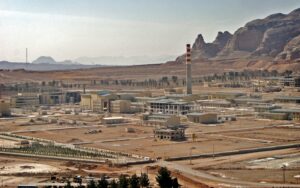
The talks between the United States and Iran are due to be held in Oman this weekend. (Photo from Reuters)
In an unexpected development on Monday, President Donald Trump announced that the United States and Iran were slated to begin talks regarding the latter’s nuclear program this weekend. While Trump has expressed that these will be “direct talks,” Iranian officials have contradicted him and insisted that they are indirect negotiations taking place in Oman. Regardless of the nature of them, adding to the significance of the development is concern over Trump’s continued warnings of a potential attack against Iran should the talks fail to be successful, with the American president even doubling down in the preceding days about the threat of using military force and the involvement of Israel in such an action. This has therefore raised unease about the prospect of further escalations in the Middle East which could dangerously drag in and entangle the United States.
As a form of protest to the various American sanctions that have been levied, Iran’s Supreme Leader Ayatollah Ali Khamenei has consistently blocked the idea of direct negotiations, and Iranian ministers have instead expressed that the effectiveness and seriousness of negotiations is more important than the form of the talks themselves. According to experts in the field, Iran is likely waiting to see if the United States will be satisfied with the talks focusing on a system of surveillance of its nuclear program. This would be much like the Joint Comprehensive Plan of Action (JCPOA) agreement – widely known as the Iran nuclear deal – that Trump pulled out of during his first term in office. The other possibility is what is called the Libya model whereby Iran would dismantle its nuclear program altogether. Israel has promoted and lobbied for this, but Iran has repeatedly stated that it will not give up on its civil nuclear program. It is believed that Iran has expanded its stockpile of highly enriched uranium by an estimated 50% following the United States’ decision to withdraw from the JCPOA in 2018 under Trump, with the limit that was imposed in the agreement now being exceeded by more than forty times. Thus, Trump’s threats of possible military action against Iran are made even more troubling by the fear that an attack might draw a response that could wreak tremendous havoc and devastation across the Middle East.
There has been a great deal of unverifiable speculation that the United States may be moving troops and arms in the region for a possible escalation of conflict involving Iran. However, these have all been conjectured without any clear evidence and primarily by individuals online with seemingly no connections to American military operations. What is known is that back in January of 2024, the U.S. quietly reached a deal to extend its military presence at Al-Udeid Air Base in Qatar – the largest United States military installation in the Middle East. It is here that many of the unconfirmed reports are claiming that American troops are being moved to, but it is uncertain why bombers and personnel would be moved here as opposed to Diego Garcia in Mauritius where the military is currently operating its attacks on the Houthis in Yemen. Hence, in addition to being unsubstantiated, the unconfirmed reports do not make full sense militarily speaking.
As issue experts have pointed out, the planned U.S.-Iran talks this weekend could lead to a deal or an escalation of conflict. There seems to be a belief that the possibility for both of these scenarios to unfold has not been as high as it is right now for a while. Some have highlighted how on the one hand, there are indications that Trump is serious about making a deal with Iran – like the letter that he sent to Supreme Leader Ayatollah Khamenei last month – but at the same time, the threats of military action against Iran have become more frequent. Getting entangled in a conflict involving Iran would just add another layer of unpredictability to an already tumultuous state of affairs in the region given the precarious circumstances in Gaza, Yemen, Lebanon, Syria, and elsewhere. It would also certainly exacerbate the array of humanitarian crises in the region, and result in heightened levels of suffering and devastation among civilian populations. All told, the Trump administration came into office for his second term pledging to reduce U.S. military commitments abroad, and therefore getting drawn into an escalated military confrontation with Iran would run completely counter to this purported philosophy.
Pew Survey Findings Mirror Those of Last Month’s Gallup Poll Regarding Americans’ Increasingly Negative Views of Israel

The American public’s views of Israel have turned more negative in recent years. (Photo from Reuters)
Similarly to last month’s Gallup poll which we covered in Issue 277 of our NIF Newsletter, a recent Pew Research Center survey has found that the American public’s views of Israel have become increasingly negative over the preceding years. This trend in sentiment has been demonstrated through polls that have been conducted since the onset of the Gaza War back in October of 2023. The percentage of American adults who expressed that they now have negative views of Israel is more than half of the population and up to 53% – a substantial 11-point increase from the 42% figure back in 2022. These new Pew Research Center findings reaffirm those of the aforementioned Gallup poll as well as a recent one conducted by Data for Progress – two analysis groups that published polls on perceptions regarding Israel and Palestine within the last few months. The repeated consistency in survey findings on this issue prove that Israel’s destructive Gaza War and the array of evidence of egregious war crimes and human rights violations have certainly had an impact on U.S. domestic public opinion.
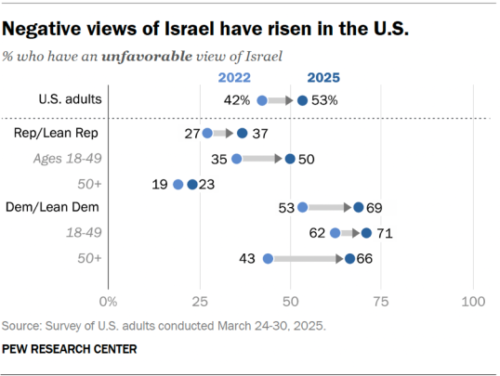
The Pew Research Center poll’s findings outlined how negative views towards Israel have increased across the board among every surveyed demographic group. While the total jump among U.S. adults overall was significant from 42% to 53%, the increases were also particularly profound among older Democrats aged 50 and above. The percentage for those in this group spiked from 43% to a whopping 66%. The survey results showed that Democrats tend to view Israel in an even more unfavorable light than Republicans, with these respective numbers being 69% compared to 37%. What is noteworthy as well is the considerable rise in younger Republicans aged 18-49 who now have negative views of Israel – an increase from 35% to 50%.
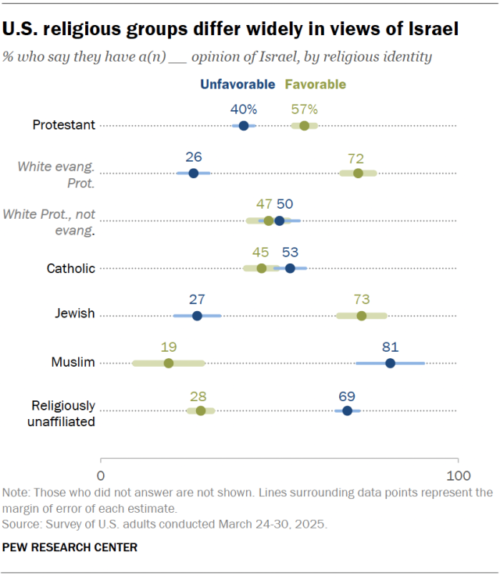
Views towards Israel among religious groups within the United States do differ widely. Unfavorability regarding Israel is especially high among Muslims and those who are religiously unaffiliated, at 81% and 69% respectively. Among Catholics and White non-Evangelical Protestants, those with unfavorable views slightly outnumber those with favorable views – by 8 percentage points among Catholics and 3 percentage points among White non-Evangelical Protestants. On the other hand, favorability figures towards Israel are higher among Protestants overall, White Evangelical Protestants, and Jewish Americans.
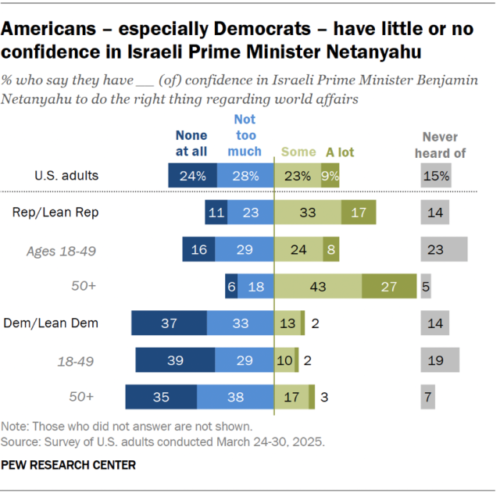
The survey respondents were also asked about their level of confidence in Israeli Prime Minister Netanyahu to do the right thing regarding world affairs. The poll found that a majority of Americans (52%) expressed that they have either little or no confidence on this. Yet again, similar to the unfavorability towards Israel percentages, more Democrats than Republicans were critical of the Israeli prime minister, as 70% of Democrats responded that they had little or no confidence compared to 34% for Republicans. On the flip side, while 50% of Republicans expressed some or a lot of confidence in Netanyahu, only a miniscule 15% of Democrats did so.
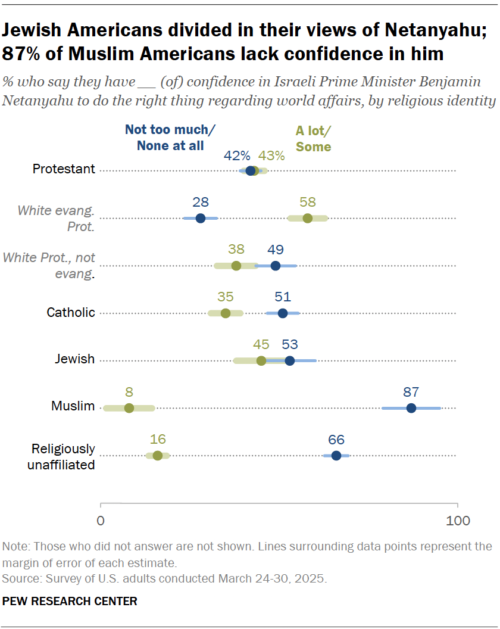
When broken down by religious identity, all groups except White Evangelical Protestants and Protestants overall had more respondents express little or no confidence in Netanyahu than those who voiced some or a lot of confidence in him. Among the five religious affiliation groups who said they have little or no confidence, this included an overwhelming 87% of Muslims, 66% of religiously unaffiliated, 53% of Jews, 51% of Catholics, and 49% of White non-Evangelical Protestants. The gaps in percentages within these religious groups between those who had little or no confidence vs. those who had some or a lot of confidence were also extremely high for two groups in particular, at 79% for Muslims and 50% for those religiously unaffiliated. They were also notable for Catholics at 16%, White non-Evangelical Protestants at 11%, and Jews at 8%.
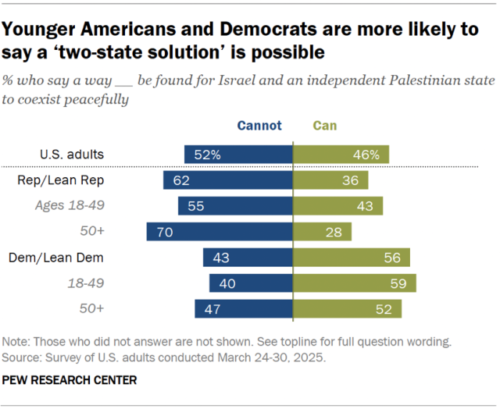
The Pew poll also examined views regarding the prospect of peaceful coexistence between Israel and an independent Palestinian state. It found that overall, 52% of respondents believe this cannot be done, while 46% believe that it can. In addition to the close 6% gap in these overall percentages, 56% of Democrats expressed their view that this is possible compared to 43% who stated that it was not. This differed considerably from Republicans with 62% of them believing this was not possible as opposed to 36% who think that it is. A sizable number of younger Republicans were more optimistic however compared to older Republicans – at 43% to 28%, respectively.
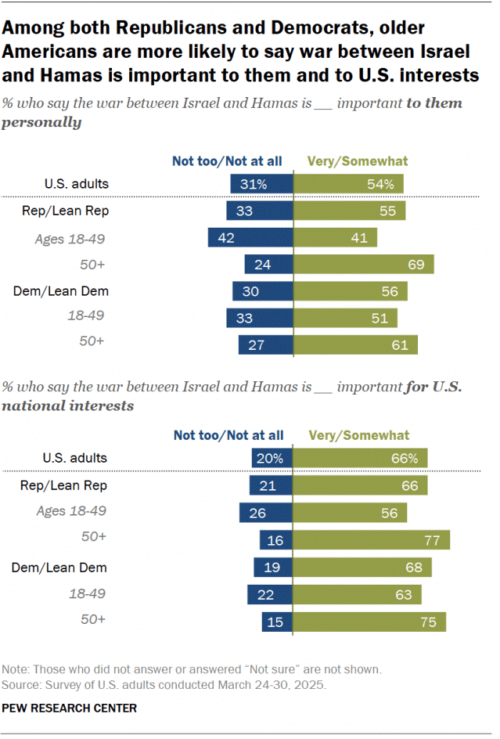
Regarding whether they believe that the Gaza War is important to them and to U.S. interests, older Americans among both Republicans and Democrats were more likely to say this than younger Americans. Among older Republicans and older Democrats aged 50 and above, 69% and 61% respectively expressed this when it comes to whether or not the war is important to them personally. The numbers were even higher when these same Americans were asked whether or not the war was important for U.S. national interests, with 77% and 75% respectively stating this. Conversely, regarding both questions, it was younger Republicans who expressed the least amount of perceived importance personally and for U.S. national interests.
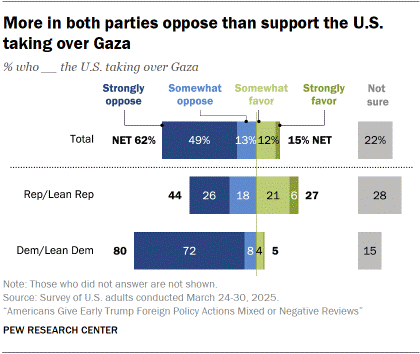
Lastly, the Pew survey respondents were asked about their level of support or opposition to the idea of the United States taking over Gaza. This notion was strongly opposed among Americans affiliated with both political parties. In totality, 62% of Americans either strongly oppose or somewhat oppose the Gaza takeover proposal, compared to only a small 15% that either strongly or somewhat favor it. Of the 4 oppose/favor classifications, the percentage who strongly oppose is way larger than those in any of the 3 other categories, as nearly half of all respondents overall – 49% – are firmly opposed to the idea. This is even more evident among Democrats, with a huge figure of 72% stating that they strongly oppose.
